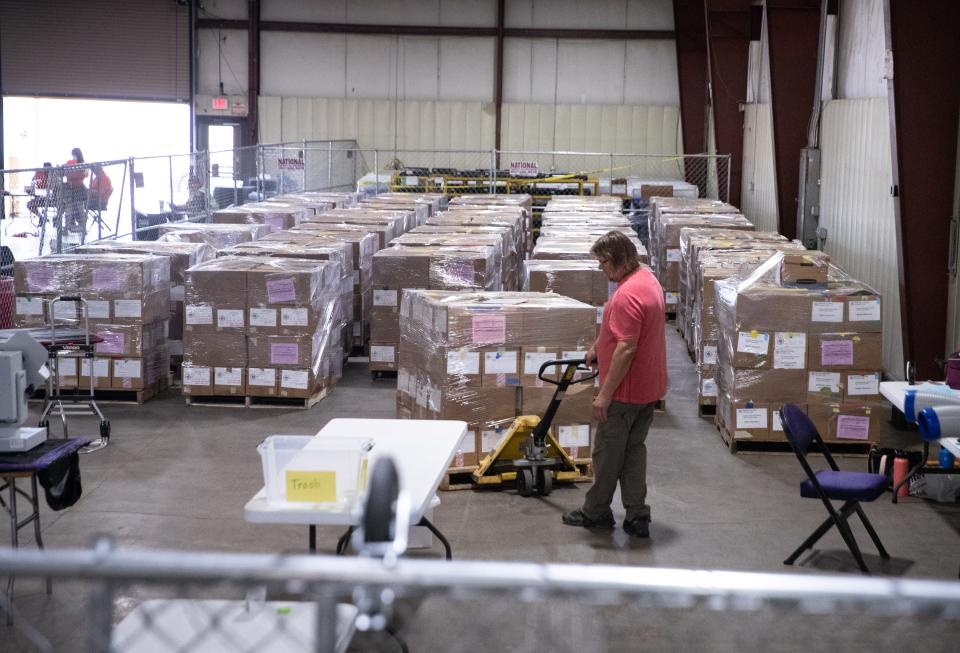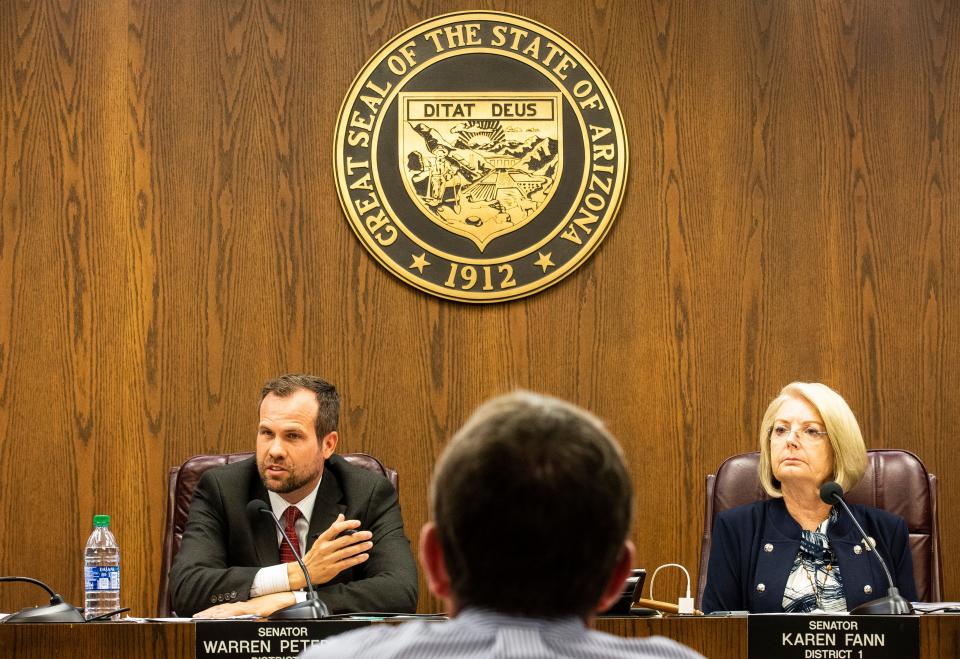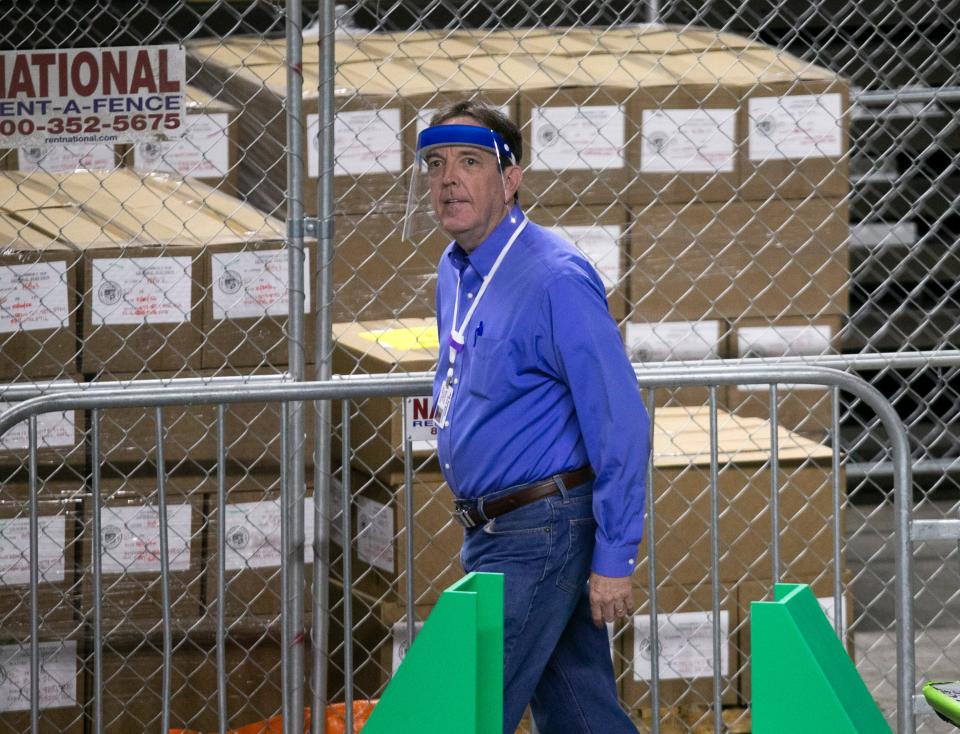Arizona election 'audit' full of ineptitude, infighting and deceit, messages show

Thousands of new documents The Arizona Republic obtained from Cyber Ninjas, the obscure company state Senate Republicans hired to conduct a partisan "audit" of the 2020 election, show the endeavor was fraught with conflict and confusion.
The contractors confided they didn't know Arizona election law when they were hired, struggled to pay bills and raise money, fought over what to report to the Senate, got deeply sidetracked by a film about their effort, and consistently were in touch with people who tried to concoct ways to keep former President Trump in office after his election loss.
Among the most revealing details in the new documents are that the lead contractor reached out to people close to Trump to ask for money to conduct the supposedly objective "audit," and others involved communicated with the former president as well.
The Republic and a left-leaning watchdog group called American Oversight sued the Senate and Cyber Ninjas for emails, texts and other communications from the project and have received batches of documents for more than a year.
Doug Logan, the CEO at now-defunct Florida-based Cyber Ninjas, which former Senate President Karen Fann chose to direct the work, has continued to fight the release of all of his communications, which a judge said were subject to disclosure.
But facing a $50,000-a-day fine imposed more than a year ago, he recently turned over thousands of texts and Signal messages.
While many of the documents remain redacted, those that aren't shed new light on the operation, which involved Senate Republicans allowing Logan and a crew of subcontractors to count and inspect about 2.1 million ballots at Veterans Memorial Coliseum in summer 2021.
These are the key takeaways from the tens of thousands of new messages.
The contractors didn't understand Arizona election procedures
Several messages indicate what experts have suggested regarding Cyber Ninjas, Wake Technologies, StratTech and others involved: They did not know much about elections, ballots or what they were looking for.
On March 21, 2021, as he was finalizing his agreement to work for the Arizona Senate, Logan had a conversation with Wake TSI executive Gene Kern. They shared an article from Phoenix's National Public Radio station, KJZZ, explaining how candidates’ names are ordered on ballots.
“It’s on my list to read through the Arizona election laws,” Logan wrote. “I guess I should move that up on the list.”
Kern replied: “Yep. I hate reading law.”
They also joked about Dominion Voting Systems equipment changing votes, even though Logan apparently was "impressed" with the machines.
Dominion makes a host of equipment used in elections and the company filed multiple defamation lawsuits amid unfounded allegations about it engaging in election fraud.
On March 29, Logan told Kern that Dominion might send someone from the company to observe if Cyber Ninjas was allowed to inspect voting equipment in Arizona.
“Good. We have a guy who works on people for getting confessions,” Kern responded.
Logan replied: “ROFL.”
Messages also reveal that Cyber Ninjas and its subcontractors struggled to count ballots.
On June 11, 2021, as the hand count was underway, a worker messaged Logan that an attorney involved with the effort, Bryan Blehm, recommended recounting some of the ballots to correct errors.
"Bryan suggested that if we finish counting, we re-do red boxes and correct them," he wrote.
At this time, various lawmakers and other visitors from other states who were sympathetic to Trump’s claims of a stolen election were touring the coliseum as they considered launching audits of their own.
Comments from the contractor appear to indicate the workers made sure they had something to see as they toured the room strewn with spinning tables used to count ballots.
“Please load me up with some people for Friday and Saturday so our visitors can see spinning,” the worker wrote Logan.
The first day of the recount in April 2021 drew instant national attention when an Arizona Republic reporter questioned why counters were equipped with blue pens. Blue ink can alter a ballot, causing it to be discarded, or confusing the voter's intent.
The state Elections Procedures Manual specifically states that anyone involved with the hand count of ballots cannot use pens with blue or black ink, which the contractors appeared not to know.
The pens were changed out and the reporter, Jen Fifield, was disparagingly dubbed "Blue Pen Jen" in messages from people working on the audit, even though her observation likely saved them from greater embarrassment and possible legal action had they begun work with blue pens.
"We are expecting a possible hit piece from Blue Pen Jen tomorrow," Logan wrote to OAN Network personality and audit fundraiser Christina Bobb one day in June.
Bobb responded: "Anything you want me to put out ahead of time to ruin her story?"
More from this investigation:Cyber Ninjas' ties to Trump during Arizona election 'audit' revealed in messages
'Dialing for dollars?': Money was a constant concern
Throughout the ballot review, Logan complained about the lack of money to complete the work, often complaining he was losing millions on the project and pulling money from his own business to keep things running.
Logan and a contact named "Todd" discussed possibly hosting a telethon once the work was done in December 2021. They also discussed Logan and another contractor signing items to offer at an auction.
“Dialing for dollars?” Logan asked. “Pretty much,” Todd responded. Todd's identity is unclear.
In August, Logan told a subcontractor that Kern took a $70,000 bonus on top of his salary before paying his workers. Kern's company stopped working on the audit shortly after it began.
Asked about this recently, Kern said he did not take such a bonus, and that Wake TSI is still owed $530,000 from Logan for work on the project.
"The contact was fixed price plus expenses. What we committed to pay staff was not part of the contract," Kern said via email.
Senate leaders at the time said Wake left because the company had reached the end of its contract. But the new documents make clear that Wake officials and Logan fought over money, with Wake even threatening to sue after the company was not paid months after it left Arizona.
Logan declined to comment when asked about the discrepancy over the $70,000.
Regarding Wake's departure from the project, Kern said it was Logan's decision.
"The initial contract term completed. Doug Logan decided that he was going to complete the project on his own," Kern said.
On Nov. 8, 2021, more than a month after the final report on the review was sent to the Senate, Logan lamented how much money he’d spent on the audit. He said he was morally opposed to bankruptcy but that he spent all the profits from his company and all his savings.
“I run a business that in a typical year grosses about $850k. On a good year I have $175k in profits on top of my salary of $125k. I have paid out $225k-$250k more than I have even fund raised. That’s all of last year’s profits, all of my savings, and any money we made this year from my AppSec business. ALL of this has been put into the audit,” Logan wrote, adding that he has lost clients, cut staff, and still owed $2.1 million to other companies.

Senate concealed Jovan Pulitzer’s involvement
When Senate Republicans announced the contractors that would work on the ballot review in March 2021, they didn’t mention the eccentric treasure hunter/inventor Jovan Pulitzer.
The new documents reveal Pulitzer was fully engaged with Logan throughout the year. He and Logan messaged continuously from March through the end of 2021.
Fann and other lawmakers thought Pulitzer was too controversial to include in the ballot review and they wanted to keep his name away from it, according to messages previously released to The Republic.
"Jovan posting on Youtube and Twitter is not helping us with selecting an independent, unbiased auditing firm," Fann wrote in February 2021 as she sought a contractor for the election review.
She was communicating at the time with Phil Waldron, a retired Army colonel who worked with President Trump’s chief of staff after his 2020 defeat to keep Trump in office.

Waldron responded: "He will not be working with our team. … I think Jovan is incapable of 'discrete.'"
During the actual review work, officials only would say that Pulitzer was consulted.
Later, emails disclosed through The Republic’s lawsuit revealed Pulitzer was in fact involved in the work. More documents released after continued court action showed Logan paid Pulitzer's company called 423 Catkins Maize $210,000 for work photographing ballots.
Logan declined to comment recently when asked if he felt this was dishonest. Pulitzer also declined to comment for this article.
And the latest messages show that at least some Senate Republicans, including Fann and Warren Petersen, knew he was working with Logan and wanted to keep his name off of the report.
In May 2021, Logan floated the idea of bringing Pulitzer to Arizona to help troubleshoot cameras used to photograph ballots, though he noted that such a visit would include limitations.
“I can’t have you at the coliseum or people will flip out,” Logan wrote to Pulitzer.
Logan and Pulitzer discussed many aspects of the work, from fundraising, press coverage and technical details to how to present information to the Senate. They often disagreed.
As the final report was being prepared in September 2021, they debated “Sharpiegate” the theory that certain pens can bleed through ballots and invalidate votes by making it appear the ballot has too many ovals filled in on the other side.
Pulitzer wanted details included. Logan didn't, writing, "Sharpiegate isn’t real.”
"The Dominion machine is actually quite precise," Logan continued. "I was kind of impressed."
It's unclear what experience Logan is citing with Dominion equipment, but he is linked to two criminal investigations for possibly accessing equipment in Georgia and Michigan in early 2021 before he came to work in Arizona. He was shown on security cameras entering a rural Georgia elections office.
It appears Logan was not always happy with Pulitzer, but he fought to include his work in his final report in Arizona.
On Sept. 14 that year, Logan seemed to lose his temper with Pulitzer as they argued about edits in the report to the Senate and whether Logan would be able to convince the Senate to include Pulitzer's work. Logan told him, “Go jump in a freaking lake.”
On Sept. 18 Logan told Pulitzer he met with the Senate and they wanted no mention of Pulitzer in the final report and senators instructed Logan not to even speak to Pulitzer again until issuing the final report, to which he would not agree.
He said the Senate lawyer threatened to declare them in breach of contract but Fann “backed him off.” He said he convinced them Pulitzer’s findings on “paper, calibration and bleed through” were important, but one unnamed member didn’t want Pulitzer’s name associated with those items. Pulitzer responded that Logan could remove his name from the report.
On Oct. 1, after the final report was made public, Logan told Pulitzer he stood up for Pulitzer’s work to Fann and “got your stuff to remain in the report.”
Even after the release of the audit findings, Logan and Pulitzer continued to investigate the election, even though Logan's report was finalized and none of the private funders of the work appeared willing to give them more money.
'The Deep Rig' appearance almost sunk the project
While Logan was in the midst of the election review, a low-budget movie called “The Deep Rig” financed by Trump sympathizer Patrick Byrne debuted, including footage of Logan discussing fraud in elections.
Because Logan’s agreement with the Senate forbade him from making public comments, he fretted about footage of him in the trailer and film, even though he apparently let the filmmakers into the restricted coliseum.
The movie attempted to persuade audiences the 2020 election was stolen from Trump, though no evidence was presented, only conjecture.
Byrne, the founder and former CEO of Overstock.com, also appeared in the film and addressed a live audience at its Phoenix premier.
Logan’s private messages show he tried to delay the release and get his interview removed so he didn’t lose his contract. The producers removed him from the film only after its premiere, which included the Logan footage.
Fann told Logan on June 3 that he, consultant Steve Montenegro and liaison Ken Bennett “need to get on the same page and out in front of this thing,” regarding the forthcoming movie release. “It’s being twisted that you and Ken are part of the crazy Q people which will hurt the audit.”
On June 18, Logan messaged Byrne that he was concerned. He said support in the Senate already was weak.
“This is going to be viewed as me breaking my agreement with them on public statements. Let alone what the leftist media is going to do with it. It is very likely to scare off PA, who is going to be difficult to convince,” he wrote, apparently anticipating he would be hired to conduct a similar election review in Pennsylvania. He wasn't.
Byrne said Logan was made anonymous in the film. Byrne also told Logan that his voice was turned into a combination of Daffy Duck and Barry White speaking over each other.
But Logan said that since the trailer for the film included Logan, he wasn’t really anonymous.
Logan also argued about his appearance in the film with producer Steve Lucescu in private messages before the release.
They discussed Lucescu visiting the coliseum with Logan. In one heated message, Lucescu said “That is bull---t Doug. You dropped the ball and now trying to blame me because your wife is freaking out on you.”
The film premiered in late June. Logan at first appeared blurred out for dramatic effect, but his identity was revealed later in the film.
After the premiere, Logan told the producer he no longer wanted anything to do with the movie. The producer told him after the release it was Byrne’s decision to leave him in the film and that he was removed from it for future showings.
In the end, it didn’t seem like Byrne liked the film he financed. He wrote a scathing critique he shared with Logan.
Bryne wrote that the "first 20 minutes are awful. It is like an Ancient Aliens meets Michael Clayton.”
Several sitting lawmakers were involved
Many of the Republican lawmakers involved in the ballot review are now serving in the Legislature after the November election. The newly released documents show a deeper level of involvement for some of them than previously known.
While Fann is no longer in office, Petersen, who appears to have received briefings about all of the audit’s proceedings, is now the Senate president.
Through a Senate spokeswoman, he declined to comment on the new messages.
"President Petersen and the rest of our leadership team are working diligently and are focused on the big issues our state is currently facing. Rehashing 2020 is not one of them," spokeswoman Kim Quintero said.

Petersen, R-Gilbert, repeatedly scolded Logan for the partisan tone of the Twitter accounts linked with the audit, and for posing with out-of-state lawmakers who visited Arizona and took photos with Logan.
"Some of those legislators are whacky or could do something whacky in the future," he wrote. "You will forever have a photo with them."
Alexander Kolodin was the lawyer for the Cyber Ninjas early on, and he’s now a member of the Arizona House who has introduced legislation related to elections.
"Alexander has gone a bit crazy inserting himself into all sorts of stuff that I didn't even directly ask him to do so," Logan once wrote to Bobb about Kolodin, adding that he was concerned Kolodin's primary motivation was raising money and not doing what was best for Logan.
Another name that appears in the messages with Logan is that of Liz Harris, who led hundreds of people to contact voters in a "canvass" as part of the audit. She was elected to the Arizona House in November.
On April 21, 2021, she sent a message to a group of audit contractors that she apparently received from a contact.
"I just received word from someone affiliated with the airlines who told me two planes full of Antifa just landed in Phoenix," the message said. "He is working on trying to find out what hotels they are staying right now."
Nobody responded.
Bennett, who served as the liaison watching the audit for the Senate as well as a media spokesperson for the work, was elected to the state Senate, where he previously served as president.

Anthony Kern, who helped count ballots but was kicked out of the audit because he was on the ballot as a Trump elector and it made the audit look bad, also returned to the Legislature this year.
Montenegro helped run the controversial audit Twitter accounts that eventually were removed from the platform, and he was reelected to the state Legislature.
Several messages from the audit involving Montenegro are redacted.
He messaged with Logan in May regarding then Secretary of State Katie Hobbs, who had observers on the floor of the Coliseum, but Logan's lawyer redacted many of the messages, citing “discussion of legal issues.”
Montenegro is not a lawyer. He runs a consulting firm.
On May 17, Montenegro sent Logan a letter county officials prepared in response to Fann, who was often at odds with the Republican county supervisors because of their reluctance to support the unusual election review.
The audit subcontractors and Senate Republicans claimed the county "deleted" election-related files on a server that was being inspected by the subcontractors. The county issued a letter rejecting those claims, and said that it was “incompetence” from the people working on the audit that lead them to believe the files were deleted when they were in fact on the server.
“Let’s shred it apart,” Montenegro wrote to Logan.
Logan responded after he read the letter.
“Mostly bs,” he said. “Totally sick of being called names.”
Logan also asked Montenegro if he could sue for defamation.
“You always have the option man. It is ridiculous,” Montenegro responded.
Logan never filed a defamation case against the county.

Someone on Logan’s team wrote and leaked a fake final report
When Logan was presenting his final report to the Senate, a fake version of his report was circulating that claimed the county election was compromised. Logan said at the time the information in that doctored report was false.
The fake report, which was reported on a right-wing news site, said "the election should not be certified, and the reported results are not reliable." Logan's actual report made no such claim, and he disavowed the fake document.
Logan's new messages make it clear he believed both the actual report and the fabricated version of it were leaked from his own circle.
On Sept. 19 Logan told Bobb he was going to share “a very important report ;-)” with a “friend of mine who is a reporter.”
Then a few days later on Sept. 23 he was shocked to find his report was leaked. “I could cry,” he wrote.
Logan also messaged a subcontractor on Sept. 27, 2021, lamenting the fake audit document.
“I still can’t believe someone leaked my report; and then someone ‘leaked” a fake executive summary not from me,” he wrote.
He lamented the leak to Michael Flynn, a former national security adviser who was a leader of the “Stop the Steal” movement after of Trump’s 2020 loss.
Logan said he was being attacked by "my side" because people were following a "narrative" that he had been intimidated into watering down his own final report.
"I am about done with this crap," Logan wrote. "I shouldn't be attacked by 'my side.'"
The long response from Flynn is redacted.
Controversial lawyer was deeply involved
The new documents also show Logan communicated extensively with Stefanie Lambert, a controversial lawyer who could lose her license to practice law in Michigan because of her participation in a meritless election case. Her involvement in Arizona was previously unknown.
Most of the messages with her are redacted, including several that are described as “ways to combat Dominion’s press release.”
Dominion issued a news release in 2021 critical of Logan's and Cyber Ninjas’ qualifications.
Lambert and Logan also discussed funding for the work and other issues.
Lambert was among nine lawyers, including Sidney Powell, involved in a failed lawsuit attempting to overturn Michigan’s 2020 election. The case was nicknamed “The Kraken” as a reference to a 1980s film in which a large sea monster is unleashed upon a city.
Among the discredited theories in the lawsuit is that ballot tabulating software crafted by confederates of deceased Venezuelan dictator Hugo Chavez helped a massive conspiracy against Trump, carried out in Michigan and other swing states.
U.S. District Court Judge Linda Parker ruled against the challenge in a scathing 36-page opinion.
“This lawsuit seems to be less about achieving the relief Plaintiffs seek — as much of that relief is beyond the power of this Court — and more about the impact of their allegations on People’s faith in the democratic process and their trust in our government," she wrote.
In addition to about $175,000 in sanctions the lawyers were ordered to pay to cover the state and city legal fees, Parker ordered the lawyers involved to complete and pay for at least six hours of coursework on pleading standards and at least six hours on election law.
The judge in that case, as well as high-ranking Democrats in Michigan, have petitioned for Lambert and the other lawyers involved in the case to be disbarred.
Republic reporter Justin Price contributed to this article.
Reach reporter Ryan Randazzo at ryan.randazzo@arizonarepublic.com or 602-444-4331. Follow him on Twitter @UtilityReporter.
This article originally appeared on USA TODAY: Arizona election 'audit' full of infighting, deceit, messages show

 money
money 